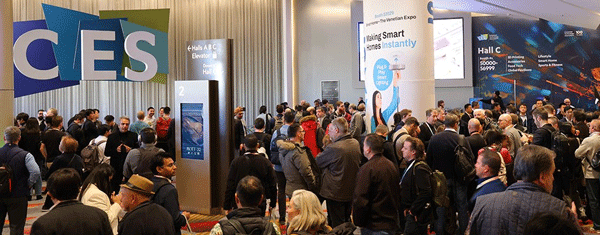2023 was the Year of AI; what will 2024 bring?
At this year’s Consumer Electronics Show, AI was unavoidable, even if many exhibits only used AI superficially. How will AI change in the coming months?
By Jeffrey Cole
 Early this month, I spent a couple of days at the Consumer Electronic Show (CES) in Las Vegas. In past years, most of the crowds (135,000 this year) were at the Central Hall looking at the latest big screens from Samsung, LG, and Sony. That hall was still full, and immovable as always, but many of the attendees made their way to the Automotive Hall, as well as the Health and Beauty pavilion, where they could see smart toasters, smart toilets, mirrors that diagnosed your health, and more.
Early this month, I spent a couple of days at the Consumer Electronic Show (CES) in Las Vegas. In past years, most of the crowds (135,000 this year) were at the Central Hall looking at the latest big screens from Samsung, LG, and Sony. That hall was still full, and immovable as always, but many of the attendees made their way to the Automotive Hall, as well as the Health and Beauty pavilion, where they could see smart toasters, smart toilets, mirrors that diagnosed your health, and more.
I had also been at CES exactly a year ago. Twelve months made one massive difference. At CES 2023, you would have struggled to find any mention of artificial intelligence. While AI was in some of the devices a year ago, the words were barely heard in Vegas.
This year, AI was everywhere
Every product slapped on a “Powered by AI” label, whether it was warranted or not. The hotdogs in the snack booths were conceived and cooked by AI (almost!) A booth would have been naked had it not promised a new AI innovation.
All this in 12 months.
Although ChatGPT (created by OpenAI) was released in November of 2022, the public didn’t become aware or get to use it until January 2023, shortly after CES 2023 was over. Had OpenAI CEO Sam Altman been a keynoter at CES 2023, he would have spoken to a half-empty auditorium. Had he spoken this year there would have been long lines of fans—camping out the day before to be sure to be one of the 2,000 people in the room. Altman is on a trajectory to be one of the most famous, wealthiest, and loved or hated people on the planet (depending on which hopes and fears about AI come true).
2023 was the year of artificial intelligence
Thirteen months ago, companies did not have AI strategies. Employees were not worried about losing their jobs to AI. (Since COVID, labor has been at its most powerful in 60 years.) Citizens looked to climate change or nuclear war as the ultimate cause of human extinction. No one outside of science fiction saw AI as much of a threat.
In was an inside joke at universities and laboratories over the past decades that AI has a great potential, and it always will. 2023 was when the public saw that potential revealed. Within two months, ChatGPT had 100 million users—even though the data it accessed was over a year old and had limited use.
Ever since two computer science students at Stanford, Larry Page and Sergei Brin, developed a new algorithm for search that disrupted Yahoo!, Alta Vista, and Ask Jeeves (as well as the advertising business, phone books, encyclopedias, and so much more), Google has expected the same disruption to happen to them.
For 24 years, they prepared as best they could for their business models and market share to be endangered by someone who could do what they did, only better. That disruptor turned out to be ChatGPT. At the beginning of 2023, Google search had an amazing 90% market share. Everybody else was an also-ran with an asterisk.
Google’s future success is not at risk. It is a high innovation company run by some of the smartest minds in the world and with very loyal users. But when ChatGPT and other competitors fully compete, Google may end up with 35% market share. Google will still be highly profitable, but it won’t own the information world the way it does now. Microsoft (now trading places with Apple on a daily basis as the most valuable company in the world) has heavily invested in ChatGPT. This is the revenge of Bing: the search engine that until now felt like a pale imitator of Google.
Because Google has always been the disruptor, it fully understands what the ChatGPT threat means. The company issued a Code Red to make Bard, its Generative AI program, competitive with ChatGPT. They even brought Larry and Sergei (now 50, and two of the richest people in the world) back to manage the battle.
Other AI battles
In mid 2023, the Writer’s Guild of America (WGA) went on strike against the movie studios and producers. A few months later, the Screen Actor’s Guild (SAG) followed. The strike had been planned as a way to make sure the newest technology since the last agreement, streaming (now with many more companies than Netflix and Hulu), treated WGA members equitably.
But as the strikes got under way, streaming became only one of the issues. AI became an important concern. Actors were afraid that they could be paid for one day’s work, and then their voices and images could be recreated till the end of time without compensation beyond the one-day. Writers feared AI-written scripts and empty writer’s rooms.
While AI was written into both agreements, those settlements could only address AI with generalities. AI was such a new concern that the Guilds didn’t have enough experience with it to know what to ask for, and the studios were reluctant to give away much because they didn’t know what the consequences would be. The next strike will come after both sides fully understand whether AI is a challenge or a boon, and what to ask for.
Although ChatGPT (created by OpenAI) was released in November of 2022, the public didn’t become aware or get to use it until January 2023, shortly after CES 2023 was over. Had OpenAI CEO Sam Altman been a keynoter at CES 2023, he would have spoken to a half-empty auditorium. Had he spoken this year there would have been long lines of fans—camping out the day before to be sure to be one of the 2,000 people in the room. Altman is on a trajectory to be one of the most famous, wealthiest, and loved or hated people on the planet (depending on which hopes and fears about AI come true).
Proof that the actor’s fears were not just paranoia became clear this month when two “internet comedians” used AI to take a rough approximation of the voice and style of George Carlin (who passed away in 2008 and is sorely missed) in order to have him comment on current events, such as school shootings, in George Carlin: I’m Glad I’m Dead, a one-hour comedy special which they put on YouTube.
It is tasteless, insensitive, poorly done, and raises many ethical and legal issues. Any fan will quickly realize it is not an homage to Carlin. Instead, it’s a cheap trick that is not done well.
Although a crude effort, it is the first of many, all of which will get technologically better.
Carlin’s daughter, Kelly, who is a talented comedian in her own right, correctly points out that those who miss her father can listen to commentary of 2024 issues through a lengthy list of today’s talented comics. Those who want to hear George Carlin himself can find his remarkable stand-up routines on HBO and elsewhere. (On January 25, the George Carlin estate sued the creators of the video, seeking damages and a court order to remove the video from YouTube, alleging that the video infringed on copyright by using Carlin’s materials to train the chatbot without seeking permission or licensing.)
Last year, we became familiar but not yet comfortable with AI. Consumers used it for their own educational, creative, or entertainment purposes. Although this month’s CES made it seem that every new development was already using AI, that isn’t true yet. 2024 is the year we’ll truly understand which of AI’s promises—and which of AI’s dangers—are real.
I have enjoyed looking myself up on ChatGPT, which told me about two important books I authored, even though I have never heard of them. It’s easier than writing! Another time, sitting with a friend who is a successful lawyer, we looked him up together and were deeply saddened to learn that he had died three years ago!
ChapGPT is clunky and full of errors. But it is improving rapidly. Over the course of 2023, ChatGPT saw remarkable updating and advances. Soon, it will be more difficult to make fun of its results.
With ChatGPT and Bard and others ready to follow, it brings back memories of the internet when AOL, Prodigy and CompuServe were fighting to be the dominant force. Over 20 years later, none of them survived. With AI even more fierce battles between competitors are about to commence.
In this critical period, it is essential that we come to understand AI’s potential influence on our lives. Is it an extraordinary tool, but one that must be used guardedly (like the internet). Will it become the tool that replaces so much else, even possibly us? Is it the most important technological innovation since the personal computer, or is it the most important technological innovation of all time?
This year we will begin to get some answers.
____________

Jeffrey Cole is the founder and director of The Center for the Digital Future at USC Annenberg.
See all columns from the center.
January 24, 2024

